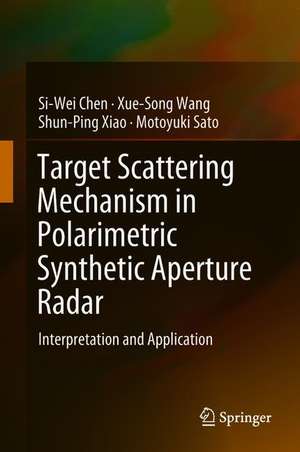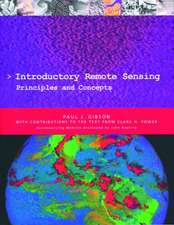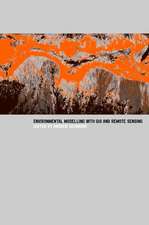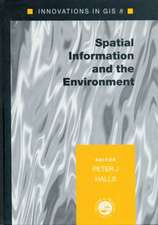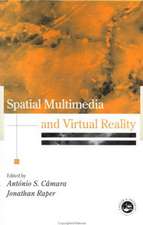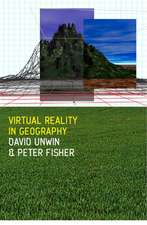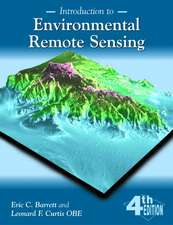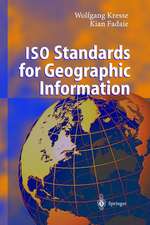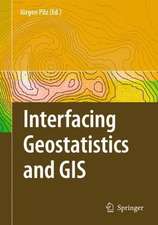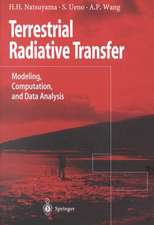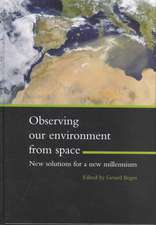Target Scattering Mechanism in Polarimetric Synthetic Aperture Radar: Interpretation and Application
Autor Si-Wei Chen, Xue-Song Wang, Shun-Ping Xiao, Motoyuki Satoen Limba Engleză Hardback – 7 mai 2018
The book is a valuable resource for senior undergraduate and postgraduate students, teachers, engineers and researchers in the field of microwave remote sensing, radar polarimetry, imaging radar, and environmental studies.
| Toate formatele și edițiile | Preț | Express |
|---|---|---|
| Paperback (1) | 637.59 lei 6-8 săpt. | |
| Springer Nature Singapore – feb 2019 | 637.59 lei 6-8 săpt. | |
| Hardback (1) | 643.84 lei 6-8 săpt. | |
| Springer Nature Singapore – 7 mai 2018 | 643.84 lei 6-8 săpt. |
Preț: 643.84 lei
Preț vechi: 757.46 lei
-15% Nou
Puncte Express: 966
Preț estimativ în valută:
123.22€ • 128.16$ • 101.72£
123.22€ • 128.16$ • 101.72£
Carte tipărită la comandă
Livrare economică 15-29 aprilie
Preluare comenzi: 021 569.72.76
Specificații
ISBN-13: 9789811072680
ISBN-10: 981107268X
Pagini: 164
Ilustrații: XIV, 225 p. 138 illus.
Dimensiuni: 155 x 235 mm
Greutate: 0.51 kg
Ediția:1st ed. 2018
Editura: Springer Nature Singapore
Colecția Springer
Locul publicării:Singapore, Singapore
ISBN-10: 981107268X
Pagini: 164
Ilustrații: XIV, 225 p. 138 illus.
Dimensiuni: 155 x 235 mm
Greutate: 0.51 kg
Ediția:1st ed. 2018
Editura: Springer Nature Singapore
Colecția Springer
Locul publicării:Singapore, Singapore
Cuprins
Basics of Radar Polarimetry and Polarimetric Imaging Radar.- Adaptive Speckle Reduction.- Advanced Polarimetric Target Decomposition.- Uniform Polarimetric Matrix Rotation Theory.- Natural Disaster Investigation and Damage Mapping.
Notă biografică
Si-Wei Chen is an Assistant Professor of the State Key Laboratory of Complex Electromagnetic Environment Effects on Electronics and Information System, School of Electronic Science, National University of Defense Technology, Changsha, China. His research interests include radar polarimetry, synthetic aperture radar, environmental study, natural disaster evaluation, remote sensing big data and deep learning. He has published more than 50 international top journal and conference papers, including Proceedings of the IEEE, IEEE Signal Processing Magazine, IEEE Transactions on Geoscience and Remote Sensing, etc. He has given more than 10 invited presentations at international conferences and top academic institutes. He has co-authored 2 patents and more than 10 patents under pending. Dr. Chen was a recipient of the Young Researcher Award from the IEEE GRSS—Japan Chapter in 2011, the Dean Prize from the Graduate School of Environmental Studies, Tohoku University, in 2013, the Best Poster Award from the IET International Radar Conference 2013, the Excellent Paper Award from the IET International Radar Conference 2015, the Excellent Paper Award from the High Resolution Earth Observation Annual Symposium 2017. He was also a receipt of the First Prize and Second Prize for Scientific and Technological Progress, Ministry of Science and Technology of the People’s Republic of China. He was granted with Tohoku University President Fellowship (2011–2012) and Chinese Government Overseas Study Scholarship (2009–2012). Dr. Chen is a Principle Investigator of 3 foundations from the National Natural Science Foundation of China.
Xue-Song Wang is a Professor of the State Key Laboratory of Complex Electromagnetic Environment Effects on Electronics and Information System, School of Electronic Science and a Vice-Dean of the Graduate School, National University of Defense Technology, Changsha, China. His research interests include radar polarimetry, synthetic aperture radar, signal processing, and target recognition. He is a Fellow of the Chinese Institute of Electronics. He has published more than 300 international top journal and conference papers and has given more than 20 invited presentations at international conferences and top academic institutes. He has co-authored 10 monographs, 13 patents and more than 15 patents under pending. He was a receipt of the Distinguished Scholar Foundation from the National Natural Science Foundation of China. He was also a receipt of the First Prize and Second Prize for Scientific and Technological Progress, Ministry of Science and Technology of the People’s Republic of China. He is a Principle Investigator of more than 20 foundations from the National Natural Science Foundation of China, Ministry of Science and Technology of the People’s Republic of China, and so on. He has served as Associate Editor of the Journal of Radar and has been a committee member of other 5 journals.
Shun-Ping Xiao is a Professor and the Director of the State Key Laboratory of Complex Electromagnetic Environment Effects on Electronics and Information System, School of Electronic Science, National University of Defense Technology, Changsha, China. His research interests include radar polarimetry, synthetic aperture radar, array signal processing, target recognition, electronics and information system simulation and evaluation. He has published more than 200 international top journal and conference papers and has given more than 20 invited presentations at international conferences and top academic institutes. He has co-authored 11 monographs, 10 patents and more than 15 patents under pending. He was also a receipt of the First Prize and Second Prize for Scientific and Technological Progress, Ministry of Science and Technology of the People’s Republic of China. He is a Principle Investigator of more than 30 foundations from the National Natural Science Foundation of China, Ministry of Science and Technology of the People’s Republic of China, and so on. He has served as a committee member of many journals and conferences.
Motoyuki Sato is a Distinguished Professor of Graduate School of Environmental Studies, Tohoku University, Sendai, Japan. He was the Director of the Center for Northeast Asian Studies. He is a Fellow of the IEEE. He was a Visiting Professor at Jilin University, Changchun, China, Delft University of Technology, Delft, The Netherlands, and Mongolian University of Science and Technology, Ulaanbaatar, Mongolia. His current interests include transient electromagnetics and antennas, radar polarimetry, GPR, borehole radar, electromagnetic induction sensing, and interferometric and polarimetric SAR. He has conducted the development of GPR sensors for humanitarian demining, and his sensor ALIS which is a hand-held dual sensor, has detected more than 100 mines in mine fields in Cambodia since May 2009. He has published more than 200 international topjournal and conference papers and has given numerous invited presentations at international conferences and top academic institutes. Dr. Sato has been a member of the GRSS Administrative Committee (since 2006), where he is responsible for specialty symposia and Asian issues. He is an Associate Editor of IEEE GRSS Newsletter and a Guest Editor of the special issue of GPR2006 and GPR2010 in the IEEE Transactions on Geoscience and Remote Sensing. He was the Chair of the IEEE GRSS Japan Chapter (2006–2007). He served as the General Chair of IGARSS2011.
Xue-Song Wang is a Professor of the State Key Laboratory of Complex Electromagnetic Environment Effects on Electronics and Information System, School of Electronic Science and a Vice-Dean of the Graduate School, National University of Defense Technology, Changsha, China. His research interests include radar polarimetry, synthetic aperture radar, signal processing, and target recognition. He is a Fellow of the Chinese Institute of Electronics. He has published more than 300 international top journal and conference papers and has given more than 20 invited presentations at international conferences and top academic institutes. He has co-authored 10 monographs, 13 patents and more than 15 patents under pending. He was a receipt of the Distinguished Scholar Foundation from the National Natural Science Foundation of China. He was also a receipt of the First Prize and Second Prize for Scientific and Technological Progress, Ministry of Science and Technology of the People’s Republic of China. He is a Principle Investigator of more than 20 foundations from the National Natural Science Foundation of China, Ministry of Science and Technology of the People’s Republic of China, and so on. He has served as Associate Editor of the Journal of Radar and has been a committee member of other 5 journals.
Shun-Ping Xiao is a Professor and the Director of the State Key Laboratory of Complex Electromagnetic Environment Effects on Electronics and Information System, School of Electronic Science, National University of Defense Technology, Changsha, China. His research interests include radar polarimetry, synthetic aperture radar, array signal processing, target recognition, electronics and information system simulation and evaluation. He has published more than 200 international top journal and conference papers and has given more than 20 invited presentations at international conferences and top academic institutes. He has co-authored 11 monographs, 10 patents and more than 15 patents under pending. He was also a receipt of the First Prize and Second Prize for Scientific and Technological Progress, Ministry of Science and Technology of the People’s Republic of China. He is a Principle Investigator of more than 30 foundations from the National Natural Science Foundation of China, Ministry of Science and Technology of the People’s Republic of China, and so on. He has served as a committee member of many journals and conferences.
Motoyuki Sato is a Distinguished Professor of Graduate School of Environmental Studies, Tohoku University, Sendai, Japan. He was the Director of the Center for Northeast Asian Studies. He is a Fellow of the IEEE. He was a Visiting Professor at Jilin University, Changchun, China, Delft University of Technology, Delft, The Netherlands, and Mongolian University of Science and Technology, Ulaanbaatar, Mongolia. His current interests include transient electromagnetics and antennas, radar polarimetry, GPR, borehole radar, electromagnetic induction sensing, and interferometric and polarimetric SAR. He has conducted the development of GPR sensors for humanitarian demining, and his sensor ALIS which is a hand-held dual sensor, has detected more than 100 mines in mine fields in Cambodia since May 2009. He has published more than 200 international topjournal and conference papers and has given numerous invited presentations at international conferences and top academic institutes. Dr. Sato has been a member of the GRSS Administrative Committee (since 2006), where he is responsible for specialty symposia and Asian issues. He is an Associate Editor of IEEE GRSS Newsletter and a Guest Editor of the special issue of GPR2006 and GPR2010 in the IEEE Transactions on Geoscience and Remote Sensing. He was the Chair of the IEEE GRSS Japan Chapter (2006–2007). He served as the General Chair of IGARSS2011.
Textul de pe ultima copertă
This book presents new and advanced concepts, theories and methodologies in polarimetric synthetic aperture radar (PolSAR) target scattering mechanism modeling and interpretation, which is dedicated to bridge the gap between the acquired data and practical applications. It proposes adaptive and generalized polarimetric target decompositions, to precisely interpret the target scattering mechanisms. Further, it develops a uniform polarimetric matrix rotation theory and a polarimetric coherence pattern visualization and interpretation tool to completely explore and characterize the deep information and target signatures in the rotation domain. Finally, it demonstrates land cover classification, target detection, natural disaster damage investigation and mapping applications which use the novel scattering mechanism investigation tools.
The book is a valuable resource for senior undergraduate and postgraduate students, teachers, engineers and researchers in the field of microwave remote sensing, radar polarimetry, imaging radar, and environmental studies.
The book is a valuable resource for senior undergraduate and postgraduate students, teachers, engineers and researchers in the field of microwave remote sensing, radar polarimetry, imaging radar, and environmental studies.
Caracteristici
It is the first book on deep interpretation and application of target scattering mechanism in polarimetric synthetic aperture radar (PolSAR) data Proposes advanced and generalized polarimetric target decompositions to precisely interpret and utilize target scattering mechanisms Provides a uniform theory of polarimetric matrix rotation to characterize and explore deep and hidden scattering features in the rotation domain Presents the application of urban damage level mapping using scattering mechanism investigation for real-world natural disasters
